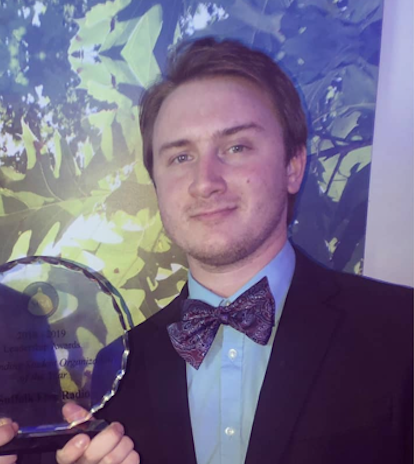Associate Professor of Journalism and author Shoshana Madmoni-Gerber had no plans of ever being a reporter or writer when she first stepped foot on a university campus. After having served two years in the Israeli army, she earned a bachelor’s degree in sociology and spent time away from her home of Israel traveling to both the United States and Europe.
“How I got into journalism is a story I love to share with my students, just to show them you don’t always end up doing what you plan to do,” said Madmoni-Gerber in an interview with The Suffolk Journal. “I had no idea what I wanted to do when I got to university, I decided to study sociology and political science but I had no idea what do with that.”
Madmoni-Gerber was 21 when she first arrived at university and she explained that Israeli people are typically older when they attend school than here in the states due to the fact that they are required to complete military service before attending university. Women are required to serve for two years and men must serve three.
“Many Israelis travel after military service because the army is such a profound experience,” said Madmoni-Gerber. “I didn’t go to combat but for many men that do go to combat you have a real existential crisis afterward, it’s something that changes you.”
She says of the Israeli culture that many people just want to live in the moment when they finish service and that they are less focused on beginning their careers right away. For Madmoni-Gerber she decided to wait until after receiving her bachelors to go abroad but said when she returned she was stuck with a degree she didn’t know what to do with.
She worked as a server at restaurant before getting fired and finding a job at a small newspaper that focused on consumerism and labor relations. It was here that writing first became an integral part of her life.
“One day I told the editor that I had been fired as a server and that I had talked to other women who had similar experiences and realized it was a phenomena and that women had been being treated unfairly, I didn’t know how to articulate it at the time, it just seemed unfair,” said Madmoni-Gerber.
Her editor challenged her to write a story about it herself, and helped coach her through doing research and setting up interviews as she began to write the story.
“I told my editor I cannot write the story I am not a reporter,” said Madmoni-Gerber. “He looked at me and told me ‘I can sense it in you; you can become one.”
The story made the front page of the paper and before she knew it , it had been picked up by the radio and other news outlets. She decided to write nonstop for a year before registering for her masters in journalism at Hebrew University. She was able to get a job right away in Jerusalem because of the experience she had gained at her first paper.
“When I graduated I got my first job at a national paper and worked there for a year and half in a section doing stories that were under the radar at other papers.” said Madmoni-Gerber. “We were a group of writers that were committed to writing about inequality and poverty doing stories that were deemed “unsexy.”
She points to having served in the military as having changed her political ideologies and views on her own country.
As she learned more about herself as a journalist, she began to question what she and her country had been doing and felt inspired to learn more about Israel’s politics and history.
“When I landed on my first journalism job I was already primed, I already had knowledge of the Israeli society and the political system and I spent a lot of time thinking about the systems,” said Madmoni-Gerber. “As a reporter I was very excited to write.”
She also wrote the book “Israeli Media and the Framing of the Internal Conflict,” in which she examines the Israeli media and its bias in reporting on the Yemenite Babies Affair. This is a topic she is strongly passionate about being of Yemenite descent herself and as member of the Israeli media which has largely glossed over the tragic treatment of Yemen people.
It was her fervent passion that would spark her writing career and keep her in the profession for years to come. She worked as both an investigative journalist and broadcast journalist at multiple Israeli publications before coming to the states to teach here at Suffolk.
“I saw reporting in a very romantic way, I thought I could change the world,” said Madmoni-Gerber. “I felt I was at the forefront of a social revolution and I could give voice to people who had been silenced for a long time and to stories that had been silenced for a long time.”







